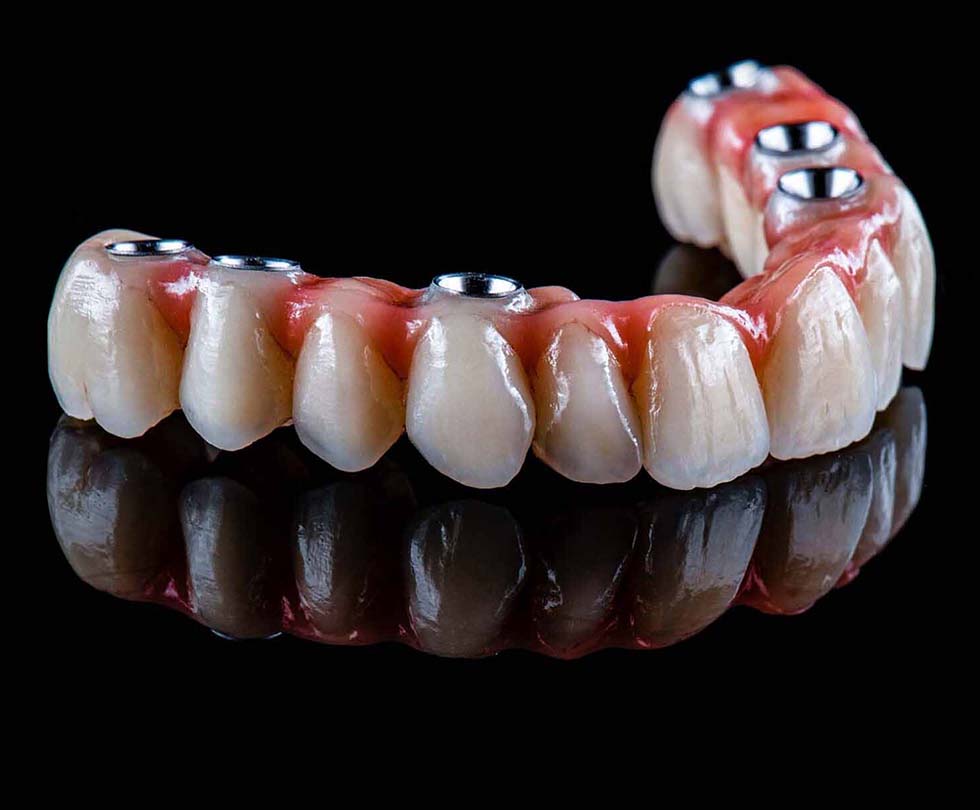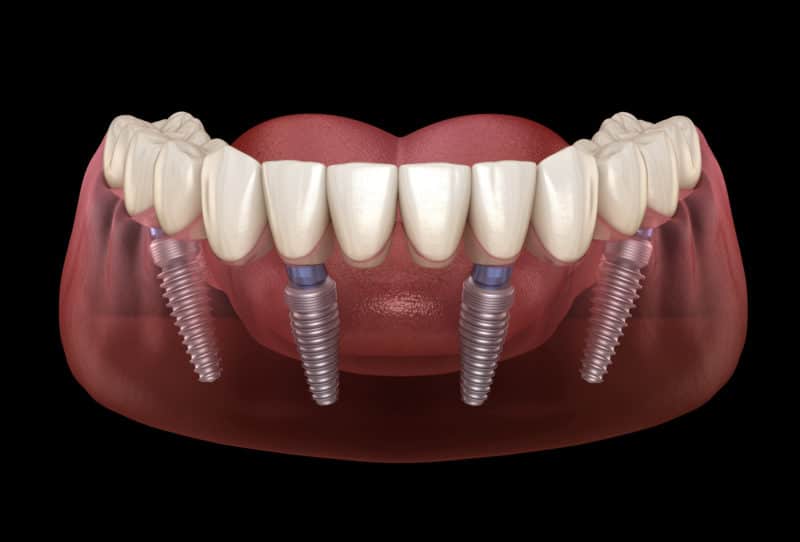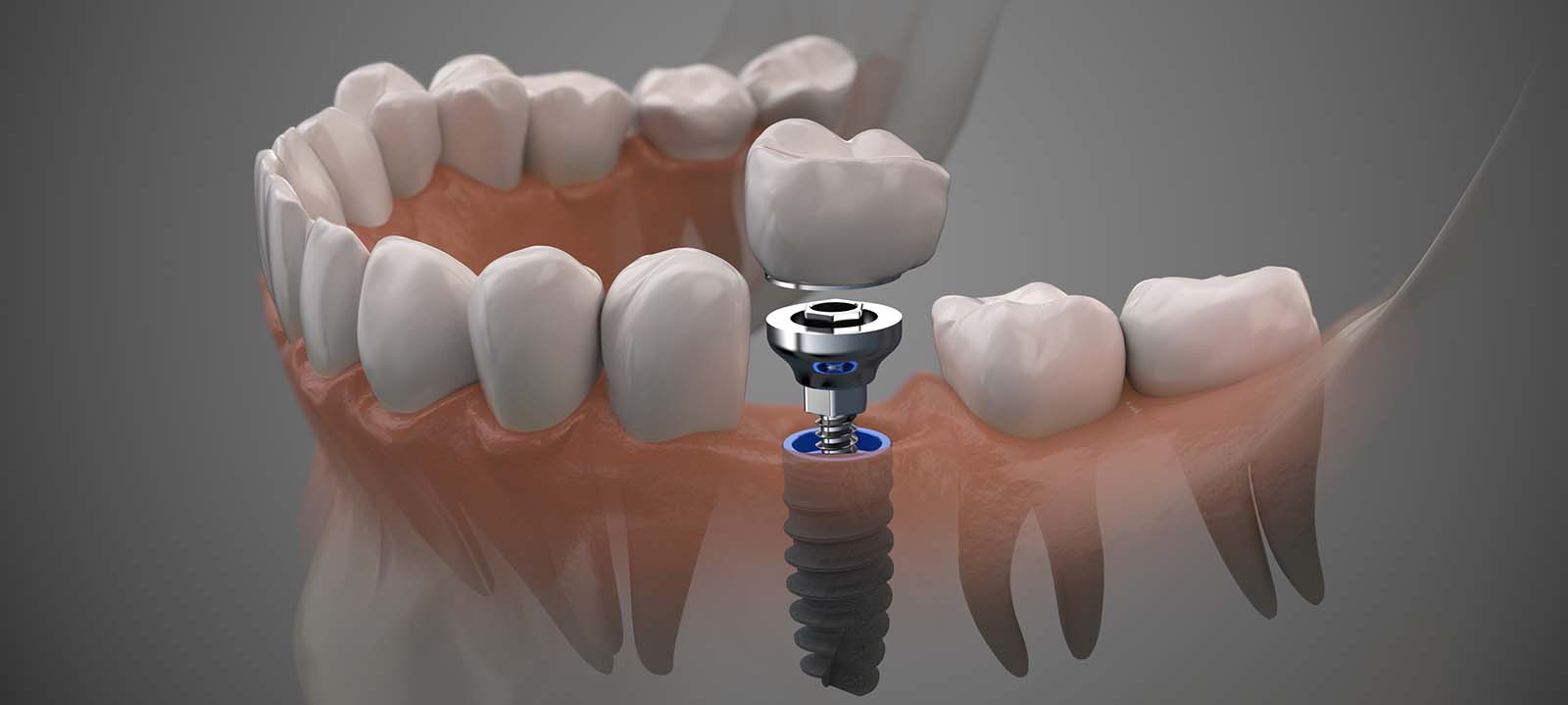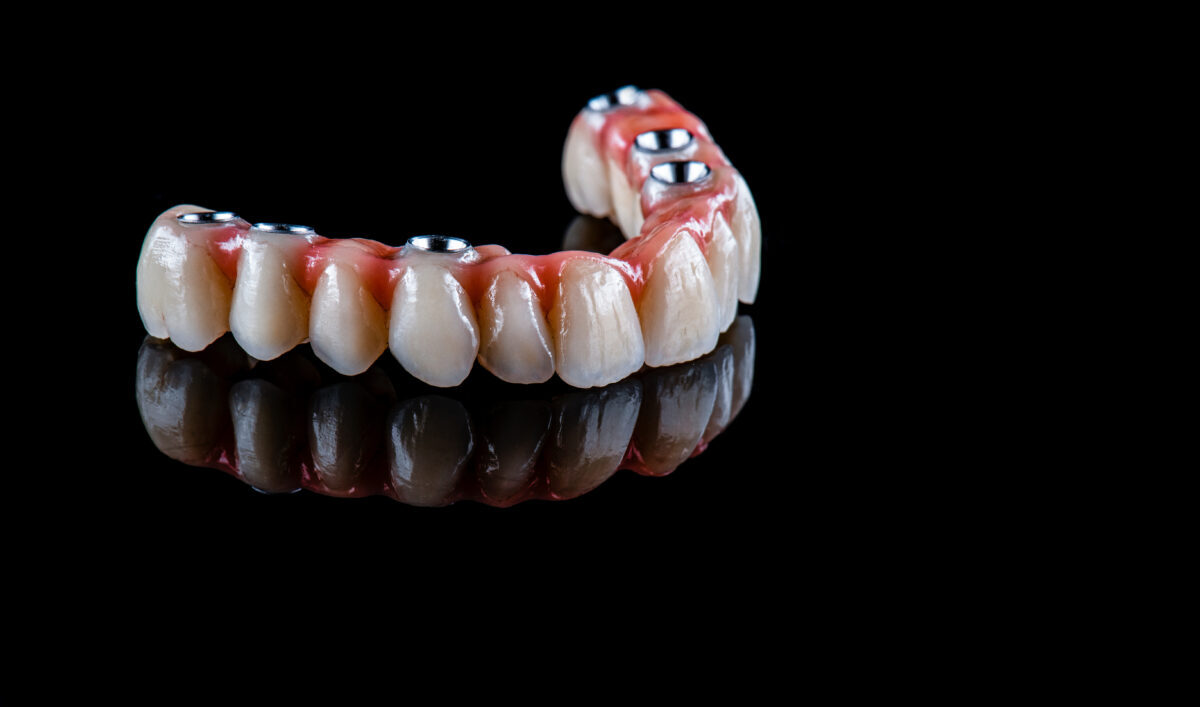Dental implants are a popular choice for people who are missing teeth. They can provide a secure and permanent solution for tooth replacement. However, dental implants failure is a possibility. In this blog post, we will discuss everything you need to know about dental implant complications. We will cover what dental implants are, the types of dental implant complications, their symptoms, and ways of preventing them.

What are dental implants?
Dental implants are artificial tooth roots that are used to replace missing teeth. They are made of titanium and are placed in the jawbone. Once they have healed, a dental crown is attached to the implant. Dental implants can be used to replace one or more missing teeth. They are a popular choice for tooth replacement because they can provide you with the look, feel, and function of natural teeth. However, there are various post dental implant problems. Dental implants failure is among the common dental implant complications.
Learn more about: What Are Dental Implants?
What is dental implants failure?
Dental implants have a high success rate. However, there is always a risk that an implant will fail to integrate with your jawbone or gum tissue. This results in dental implants failure, where you will need to have it removed from your mouth and replaced by another one.
Can a dental implant fail?
Yes! Dental implants do not always work as intended, even though they are very reliable and effective at restoring missing teeth. There’s no guarantee that every single person who has one implanted into their jaw bone will succeed fully in having their tooth restored without any problems. In some cases, dental implant failure does occur.
Causes of dental implant failure
There are many different reasons why dental implants fail to integrate with your jawbone or gum tissue and result in dental implant failure. Some of the most common causes include:
- Poor oral hygiene – If you do not maintain good oral hygiene practices, bacteria can build up around the implant site and cause an infection. This can prevent the implant from fusing with your jawbone and lead to problems after dental implants.
- Smoking – Cigarette smoke contains toxins that can damage the cells and tissues in your mouth. This increases your risk of developing an infection around the implant site and leads to a higher chance of dental implant failure.
- Gum disease – Gum disease is a common dental problem that can cause inflammation and infection of the gums. If left untreated, it can spread to the implant site and cause tooth implant problems.
- Poor bone quality – If you do not have enough bone in your jawbone, you may not be a candidate for dental implants. The lack of bone tissue can prevent the implant from fusing with your jawbone and result in failure.
- Age – Age is among the dental implant risks. Older adults are more likely to experience problems with their dental implants due to poor bone quality and health issues.
What are the signs of dental implant failure?
Dental implants have a very high success rate, but they are not 100% guaranteed. If you notice any of the following symptoms, it’s important to contact your dentist immediately:
Pain at implant site – The most common symptom is pain around where the dental implant was placed in your jawbone or gum tissue. This could indicate an infection has developed and needs treatment before it spreads further into other parts of the mouth, causing more problems with other teeth nearby.
Bleeding from gums near implant area after brushing, for example (this indicates poor oral hygiene). If there is bleeding around where your tooth used to be, then this can also mean that something has gone wrong, such as an infection that might need antibiotics if left untreated long enough.
Swelling of gums near implant area as well because swelling around where your tooth used to be another sign something has gone wrong like an infection which might need antibiotics if left untreated long enough.
Sensitivity when eating or drinking hot foods/drinks due to inflammation on the nerve endings in this area (this indicates poor oral hygiene). If there is bleeding around where your tooth used to be, then this is among the signs of dental implant failure.
Pain while chewing hard food. This is one of the common dental implant failure symptoms. If you have pain when chewing, it could indicate an infection in the bone tissue surrounding dental implants. It’s important to seek treatment right away if you’re experiencing this symptom.
Dental implants failure – Obviously the most serious sign of all, dental implant failure occurs when the implant fails to fuse with your jawbone and results in the loss of the tooth.
What happens if a dental implant fails?
If your dental implant fails, it’s important to seek treatment right away. Depending on the cause of the failure, your dentist may be able to treat it and save the implant. However, in some cases, surgery may be required to remove the failed implant and replace it with a new one. In extreme cases, where too much damage has been done, you may need to have all of your teeth removed and replaced with dentures or bridges. But if you’re experiencing any of these symptoms and want to avoid dental implant complications, make sure that your dentist is aware so they can recommend ways to prevent it from happening in the first place.
What is dental implant rejection?
Dental implant rejection is an inflammatory condition of soft tissue around dental implants. The implants are rejected after five days to three months. At this time, there is a large lymphocyte infiltration into the peri-implant tissues that is not seen with chronic inflammation leading to fibrosis and scarring. This causes the loss of one or more teeth.
What are the symptoms of a dental implant rejection?
The most common type of dental implant-rejection occurs within the first couple of weeks following surgery. Symptoms include:
- swelling
- redness
- pain at or near the site of the procedure
- fever (rare).
Dental implant-rejection is a rare condition, but if you experience these symptoms, call your dentist immediately to schedule an appointment or emergency consultation. If left untreated, rejected dental implants will need to be surgically removed and replaced with new ones or else they will cause severe dental implant complications.
How is dental implant failure treated?
When tooth implant issues occurs, they must be corrected as soon as possible. The best thing to do is to see a dental implant specialist who will take care of the dental implant and treat it appropriately.
Dental implant replacement is done by removing the old dental implant crown and replacing it with a new restoration or crown. If there is too much bone loss due to infection or fracture, bone grafting may also need to be performed.
This tooth replacement procedure for dental implants may require more time than other tooth replacements like bridges, but it offers an excellent alternative for people who need tooth replacement options.
How is dental implant rejection treated?
Treatment depends on the degree and location of implant rejection. Usually, severe dental implant rejection symptoms can be resolved by dental implant surgery, such as dental implant replacement surgery or dental implant revision surgery, which can completely treats front tooth implant complications. In some cases, such as dental implant infection (which is an extreme form of dental implant rejection), a tooth extraction may be required first to treat the dental implant infection before dental implants can be placed again. Some dentists recommend replacing the existing dental implants with new ones due to stiffness and pain related to older dental implants that were not made from high-grade titanium materials. This helps prevent other health problems from using older dental implants containing nickel and chromium. If your dentist recommends removing your old dental implants, dental implant removal surgery will be required.
How to plan for a dental implant surgery
One of the most important things to do before a dental implant surgery is to plan. This means making sure you have all the information you need and that you are aware of what to expect on the treatment of dental implant complications.
To begin with, it is helpful to understand exactly what a dental implant is. A dental implant is an artificial tooth root that is placed into your jawbone to hold a replacement tooth or bridge in place. The implant itself is made of titanium, which fuses with your natural bone over time.
Once you know what to expect from the procedure, you can start planning for it. One thing to consider is how long you will need to take off work. Most people require at least two days off after the surgery, but this may vary depending on the person.
It is also important to plan for the cost of dental implants. Usually, you will need at least one replacement tooth or bridge, and it is best to have them all done in a single appointment so that they can be placed simultaneously. Depending on your insurance coverage, this procedure may be covered by your plan, or it could cost up to several thousand dollars out-of-pocket. It’s always a good idea to check with your dentist first before scheduling any implant surgery date – make sure there are no surprises when it comes time for payment.
You should also prepare yourself mentally for what happens during and after the surgery itself: how much pain may occur as well as any dietary restrictions that might come up afterward. You should expect a certain amount of swelling after the surgery, and you may need to take medication for this as well.
The most important thing to remember is that dental implant surgery should not be taken lightly. It is a serious procedure, and it’s best to be as prepared as possible before going through with it. By planning ahead, you can ensure a smooth and stress-free experience.
If you are considering dental implants, please consult with your dentist first to see if they are the best option for you. Dental implants are not always the right solution for every case, so it’s important to get all of the facts before making a decision. And above all else, remember to relax and take things one step at a time – after all, preparation is key when it comes to any surgical procedure.
Possible dental implant complications after surgery
Surgery to place a dental implant in the jaw bone can cause problems such as infection, nerve damage, or even death. An implant is a metal screw-like object made of titanium that is surgically placed into the jaw bone. The implant acts like a tooth root and provides support for an artificial tooth replacement (crown). Dentists refer to implants as “roots” because they serve the same purpose as natural teeth roots: They allow us to chew and speak correctly; stabilize adjacent teeth; preserve facial structure; and help maintain proper bite relationships (occlusion), which helps prevent other problems such as gum disease and deterioration of the jawbone. To avoid potential complications during surgery, patients take antibiotics before dental implant placement, but these drugs do not always prevent infection. In fact, some patients experience surgery-related complications. Implant surgery is a big deal. According to the American Academy of Periodontology (AAP), among those who have dental implants placed, 1 out of 4 has implant surgery again within 5 years due to a complication or failure of an implant. The AAP also reports that as many as 25 percent of dental implants fail over time and need to be removed and replaced. Because dental implants are so durable, this risk for removal may increase with age.
Infections can occur during surgery or afterward from poor oral hygiene or another source, such as tooth decay at the site where the crown will be placed on top of the implant post. When germs infect tissue surrounding a tooth implant, it is called peri-implantitis. If not caught early, peri-implantitis can lead to implant failure. Symptoms of this include the gums becoming sore or tender, inflamed or swollen, red or pink in color, and receding away from the crown. A potential complication during surgery is damage to the inner lining of your cheek (buccal), tongue, lip, or chin tissue with instruments used by the dentist to insert the dental implants. With more than 3 million Americans already living with dental implants, according to a 2009 estimate by Market Data Retrieval Inc., these complications are important for people who are considering implants as well as their dentists and physicians. Signs that you may be experiencing nerve damage include pain, burning, numbness, and tingling in the surrounding teeth and/or cheek.
Surgery has always been a high risk for people with diabetes as it poses an increased chance of infection. If you have Type 1 or Type 2 diabetes, your blood glucose (blood sugar) levels must be closely monitored during dental implant surgery to make sure they do not become dangerously low (hypoglycemia). Low blood glucose is annoying and may cause temporary disorientation and trouble speaking, but it can lead to coma and even death if untreated. Sometimes a tooth implant procedure fails because the dentist does not wait long enough before attaching the artificial tooth replacement (crown), which results in overgrowth of bone tissue around the implant post. This complication is irreversible.
In summary, dental implant surgery is a big deal, and there are a lot of complications that can happen. Make sure you do your research on your dentist before going through with surgery, so you know what to expect after surgery.
How to maintain your implants and prevent dental implant complications
When it comes to maintaining your dental implants and avoiding any sort of complications, one thing you must pay attention to is the position of your implant in relation to your tongue. If you put too much pressure on them while speaking or eating, you could cause the implant roots to become loosened over time. Therefore, to avoid this type of dental implant complication, you should always speak and eat carefully to avoid putting too much pressure on your implants.
Also, it is a good idea to pay attention to how much pressure you are applying when brushing your teeth. Because your implants have been attached to the bone structure underneath them, there is a risk that they can become loosened if not cared for properly. If you find yourself pressing very hard into your gums or brushing with a lot of force, you may want to switch over to a soft toothbrush instead as this could help prevent any damage from occurring in the days ahead.
Speaking of brushing your teeth, one thing that many people do not realize is that the brush can actually wear down tooth enamel as well as reduce the luster of your dental implants. In order to avoid experiencing this type of dental implant complication, it is best to use a very soft brush and gently rub the brush across your teeth in a back-and-forth motion.
In some cases, people will brush their teeth too hard simply because they are in a hurry to get out the door in the morning. If this sounds like you, it is probably time that you change up your tooth brushing routine until you can learn how to do it properly without putting any excess pressure on your teeth or implants. However, if you happen to be suffering from gum disease or even gum erosion around your implants at this point, make sure you visit your dentist immediately so they can fix the issue before it gets worse.
When it comes to the bristles on your toothbrush, you will want to make sure you replace them at least once every three months or so. Over time, these bristles become worn down and can even begin to tear into the gumline around your implants if they are not replaced soon enough. Besides replacing the brush head of your toothbrush regularly, you should also try and avoid placing any excess pressure on it when applying toothpaste or holding onto the handle tightly for too long.
If you enjoy using an electric toothbrush because this type of cleaning tool is more powerful than a manual one, there is still a risk that you could wear down tooth enamel due to plaque buildup inside of these devices. Plaque is a sticky substance that forms in between teeth and the implants in your mouth when you do not brush them enough. If you can wipe out this plaque before it hardens into tartar, then you will definitely want to try and keep up with dental hygiene on a daily basis.
When someone gets braces for the first time, they may be cautioned about removing any food fragments from between their teeth and around the metal brackets on their teeth. This is because plaque buildup inside of these spaces can lead to tooth decay or gum disease if left untreated. The same thing is true for dental implants; once your dentist places them under your gums, there is an increased risk of developing gum disease underneath if food particles are allowed to accumulate over time.
If you are unable to brush your implants or even your mouth in general, you may want to use floss threaders. These tools help remove food particles that have become stuck between the small crevices around dental implants. However, be sure not to pull floss too tightly around these metal fixtures because this can tighten their grip on your teeth and gums, causing damage over time.
Besides brushing your teeth properly every day at home, make sure you are also visiting your dentist for cleanings once or twice a year, depending on whether you need them more often due to gum disease symptoms or not. After all, no matter how well one takes care of their implant-supported teeth, there is always a risk that plaque will build up underneath the dental crown. Thus, it is important to visit your dentist at least once a year for professional cleanings so they can eliminate any plaque buildup before it has the chance to turn into tartar that cannot be removed by brushing or flossing alone.
Conclusion
Success of contemporary implant dentistry relies on accurate assessment of patients and patient-related factors, detection and elimination or management of risk factors, early recognition of complications and immediate treatment intervention. This comprehensive service is available at the best dental implants dental practice in Los Angeles.
Where to get the best dental health services?
If you are looking for high-quality dental care services, look no further than Southland Dental Care. Our practice offers a wide range of services, from general dentistry to cosmetic dentistry and everything in between. Plus, we have a team of experienced and skilled professionals who can help you achieve the best possible results.
One of our most popular services is dental implants. Implants are a great option for those who are missing one or more teeth, as they provide a natural-looking and functional replacement tooth. And at Southland Dental Care, we offer some of the best cost of dental implants in Los Angeles.
So if you’re looking for quality dental care that won’t break the bank, or you have an issue of your dental implant not healing, come see us at Southland Dental Care. We’ll be happy to help you achieve the beautiful and healthy smile you deserve.
Clinical research on dental implant failure suggests various contributing factors, as highlighted in this PubMed article.














